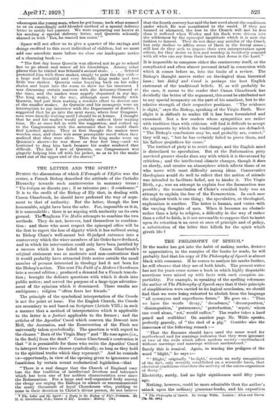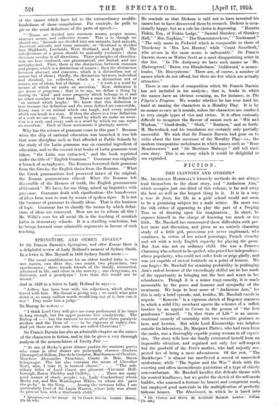THE -PHILOSOPHY OF SPEECH.*
IF the reader has got into the habit of making marks, derisive or appreciative, in the margins of the books he reads, he will probably- find that his copy of The Philosophy of Speech is almost black with comment. If he comes to analyse his marks further, he will observe-that they are of both kinds. The present writer has not for years come across a book in which highly disputable assertions were mixed up with facts with such complete im- partiality. For example, in 'speaking of the spelling reformers the author of The Philosophy of Speech says that if their principle of simplification were carried to its logical conclusion, we should find that •we were -being exhorted to abolish from -the -language
" all synonyms and superfluous forms." He goes on " Thus we have the words ' decay," decadence," decomposition,' ' disintegration," putrescence," putrefaction," sepsis,' where one word alone, rot,' would suffice." The reader takes a hard pencil and scribbles ! On another page Mr. Willis speaks, perfectly gravely, of " the rind of a pig." Consider -also the
innocence of the following remark :- " That the Romans should have used the same- word for motherhood and for marriage indicates that they were ignorant of two of the evils which affect modern society—motherhood without marriage and marriage without motherhood."
Surely this is ironical. Again, in tracing the pedigree of the word " blight," he says " Blight,' originally ' be-light,' reveals an early recognition of the fact, only recently established on a scientific basis, that electrical conditions stimulate the activity of the micro-organisms of decay."
Electricity, surely, had no light significance until .fifty years ago.
Nothing, however, could be more admirable than the author's attack upon the ordinary grammar-books, and his exposition
• The Philosophy of Speech. By George Willis. London : Allen and Cowin. bd. net.]
of the causes which haVe led to the extraordinary muddle- headedness of these compilations. For example, he pulls to pie:es the usual definitions of the parts of speech :-
" ' Nouns are divided into common nouns, proper nouns, abstract nouns, and collective nouns.' This is as though we should say, Animals are divided into sea animals, land animals, American animals, and tame animals,' or Scotland is divided into Highlands, Lowlands, West Scotland, and Argyll.' The sub-divisions of a genus should be mutually exclusive ; these divisions overlap in all directions. Three principles of classifica- tion are here confused, one grammatical, one logical, and one metaphysical. First, there is the distinction between common and proper, which is a distinction of names ; then the distinction between abstract and concrete, which is a distinction not of names but of ideas ; thirdly, the distinction between individual and dividual, i.e. collective, which is a distinction not of names, nor of ideas, but of things. . . . A verb is a word by means of which we make an assertion.' Now, definition is per genus et propriunt ; that is to say, we define a thing by stating its kind ' and some property which belongs to it and no other member of that kind. Thus a man can be defined as an animal which laughs.' We know that this definition is true because the definition and the term defined are convertible. Every man is an animal which can laugh, and every animal which can laugh is a man. if then the above is a true definition of a verb we can say, Every word by which we make an asser- tion is a verb, and every verb is a word by which we can make an assertion.' Each of these statements is glaringly untrue."
Why has the science of grammar come to this pass ? Because when the ship of national education was launched it was felt that some discipline such as that afforded at Public Schools by the study of the Latin grammar was an essential ingredient of education, and so the current text-books of Latin grammar were taken, " the Latin was extracted," and the book reprinted under the title of " English Grammar." Grammar was originally a branch of metaphysics. The Romans borrowed their grammar from the Greeks, the English theirs from the Romans. " What the Greek grammarians had preserved intact of the original, the Roman grammarians effaced. What the Romans left discernible of the likeness of truth, the English grammarians obliterated." We have, for one thing, mixed up linguistics with grammar. Grammar deals with signification—the transference of ideas from man to man by means of spoken signs. It is not the business of grammar to classify ideas. That is the business of logic. Grammar has to classify the means by which defini- tions of ideas arc conveyed. How are we to reform all this ? Mr. Willis's cure for all social ills is the teaching of monkish Latin in elementary schools. It is a startling conclusion, but ho brings forward some admirable arguments in favour of such teaching.



































 Previous page
Previous page